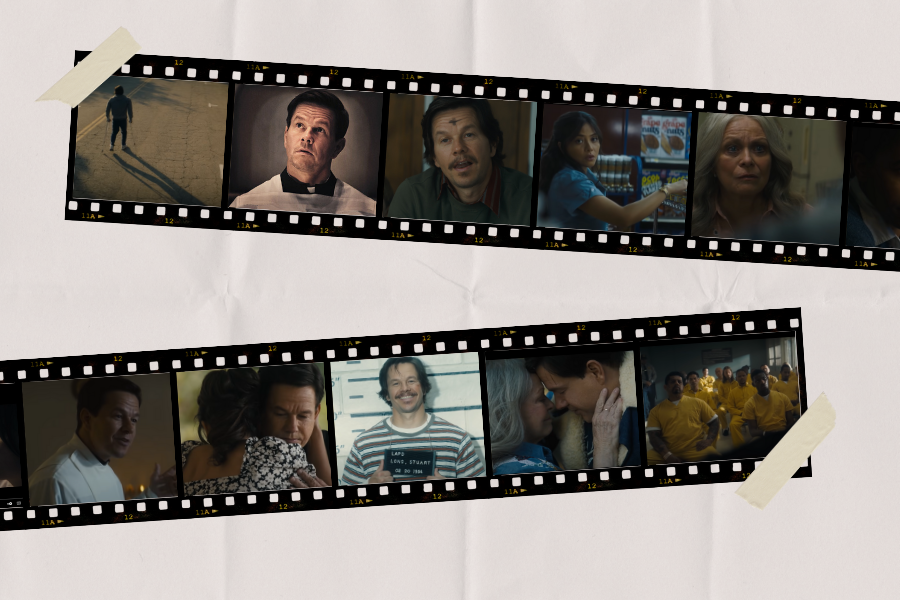Mark Wahlberg delivers captivating performance in ‘Father Stu,’ story of faith, love and redemption
Mark Wahlberg stars as boxer-turned-priest Stuart Long in “Father Stu.”
April 14, 2022
This article contains spoilers.
“Father Stu” is different from any other faith-based film I‘ve ever watched. The movie’s protagonist, Stuart Long (Mark Wahlberg), gets into bar fights, drives under the influence and beats up seminarians. He gets arrested an hour into the film.
This movie shows us the brokenness of humanity from the get-go. We quickly learn that the loss of his younger brother and abandonment by his alcoholic father (Mel Gibson) have scarred Long since he was a child.
Long begins attending church regularly after falling in love with a Catholic woman (Teresa Ruiz). But it’s not until surviving a harrowing motorcycle accident that he dedicates his life to God. He decides to become a Catholic priest, and even after a debilitating disease hinders him, Long’s determination to achieve his goal and devotion to God carry him forward.
After watching “Father Stu,” it’s easy to see why Wahlberg said this film is his passion project. The story is based on the life of boxer-turned-priest Stuart Long, who passed away at the age of 50 and had a troubled past before coming to faith. Wahlberg’s own journey to a life of faith parallels his character’s and elevates the film.

“No one wants to hear the gospel from the mouth of a gangster,” a seminarian says to Long. Long responds, “Maybe that’s exactly what they need.”
This approach is what makes Stuart Long so special. He is a flawed person, like everyone, but he embraces his failures. Unlike some people of faith, Long was slow to condemn others for their sins because of his own past and lived experience.
“We’ve all been wronged, and we’ve all done some wrong,” Long says in his first sermon. “But (Jesus) came to forgive us.”
While a fellow seminarian makes a racist implication and preaches pretentiously to prison inmates, Long connects with them through a brutally honest yet empathetic approach, urging them that it’s not too late to turn their lives around.
What’s refreshing about this film is its empowerment of progressive Christianity. Dialogue such as “God gave us a sense of humor so we’d use it,” “sexuality is a gift from God” and “denying it is denying something he wanted us to have,” epitomizes the contrast in the movie’s approach from more rigid representations of faith. In doing so, it embodies the emphasis on love and inclusion at the core of Christianity.
Wahlberg’s charm, wit and dry humor shine through, whether he’s grinning playfully in a mug shot, “borrowing” his father’s truck or even laughing in the midst of tragedy.
The film’s score accurately captures the emotional beats of pivotal moments in Long’s journey, and first-time writer-director Rosalind Ross crafts a riveting narrative of redemption.
His parents, played by Academy Award Winner Mel Gibson and Academy Award Nominee Jacki Weaver, create a compelling dynamic in challenging their son’s religion that leads Long to double down on his unwavering faith.
As I sat through two pre-screenings of the film in Chicago, I heard audience members laughing in hysterics one minute and sobbing the next. I witnessed firsthand the emotional impact this story had on people and could feel just how many lives the real Long touched.
I watched the broken, belligerent boxer — with all of his trauma, grief and pain — transform into a living embodiment of love and grace.
Wahlberg delivers an emotional, heartfelt performance, perhaps the best of his career, adding nuance to the film like no one else could.
“Father Stu” is a movie for believers and nonbelievers alike. It’s a true story that will move people. It’s an outrageously funny, heartfelt and uplifting drama about the redemptive transformation of one man’s soul through the grace of God and the power of faith.
“Life’s gonna give you a gut-full of reasons to be angry,” a man resembling Jesus tells Stu at a bar. “You only need one to be grateful.”
Email: andresbuenahora2024@u.northwestern.edu
Twitter: @andresbuena01
Related Stories:
— Reel Thoughts: “Money Heist” brings the action in its final season
— Reel Thoughts: “Emily in Paris” was not written to be taken seriously
— Reel Thoughts: “Dune” is definitely sand power, but does that matter for Hollywood?



